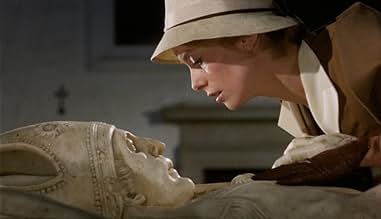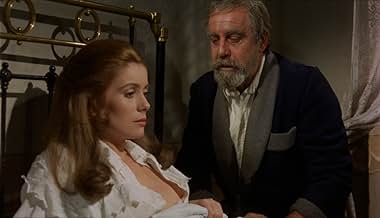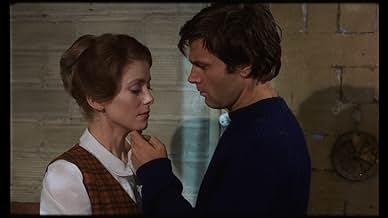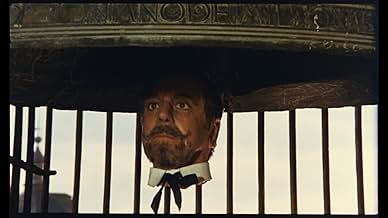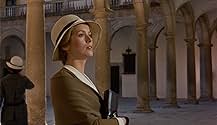Tristana
- 1970
- Tous publics
- 1h 39m
Shortly after her mother's death, an innocent and youthful woman becomes the ward of a middle-aged nobleman who wants to control her.Shortly after her mother's death, an innocent and youthful woman becomes the ward of a middle-aged nobleman who wants to control her.Shortly after her mother's death, an innocent and youthful woman becomes the ward of a middle-aged nobleman who wants to control her.
- Director
- Writers
- Stars
- Nominated for 1 Oscar
- 11 wins & 4 nominations total
- Muchacha
- (as María Paz Pondal)
- Don Cándido
- (as Juan José Menéndez)
- Director
- Writers
- All cast & crew
- Production, box office & more at IMDbPro
Featured reviews
Not the most surrealistic work, yet, probably one of Buñuel's ten most well-made.
"Tristana" contains many of the common factors of Buñuel's movies: his total contempt for the ruling sectors of society and the rich people, for hypocrisy and Puritanism; his irreverence, and a wicked and implicit sexual content. Only the man who made "Belle de Jour" would dare to amputate a leg to the goddess Deneuve (one of the most beautiful creatures that ever walked the earth). Fernando Rey plays a typical Spanish "hidalgo" that's come down in the world and that sexually harass his stepdaughter.
So, Buñuel not only hadn't lost his touch with the years, on the contrary, he felt more and more free as the time went by to let his genius flow *My rate: 8/10
Tristana, played brilliantly by Catherine Denueve, is the central character whom we see evolve from an innocent young girl with her many ideals about love and relationship, to a bitter and cynical woman at the film's end who cannot believe in anything any longer. It is with special finesse that Deneuve plays her, that we witness, with heartbreak, every turn of her back on the things she love, and every rejection of all morality that she held before.
Fernando Rey's character is probably the murkiest but ultimately most empathetic character, as at the end of the film, age wears off his hard-edged cynicism and turns him into the loving father figure that Tristana desperately needed in the beginning of the film. In a sense, it is a film about age, how when we reach a certain point in our lives we see things much clearer and as it is, rather than try to twist things to our advantage. The way Rey's character treasures the time with the vile and vindictive Tristana at the end of the film is not only overwhelmingly sad, but also an epiphany by an auteur who is gaining age himself.
In spite of all its dramatic turns of events, Tristana is not an emotional and angsty film in its portrayal of its characters' lives. Instead it is a soft and peaceful film that sympathetically accepts its characters' flaws as much as it forgives them. It is a film that evokes the intricate feeling of looking back in our dark and troubled past and finding the exquisite moments of happiness amidst all the cynicism and grit. When, towards the end, Rey reaches the peace that he has been struggling so hard to attain throughout the film, he notes, 'It's snowing so hard outside, but in this house, I'm nice and warm. What's there not to be happy about?'. A silent recognition that peace is not bending reality to your own will, but merely, acceptance.
Buñuel's attention to detail is extraordinary. Every scene is packed with visual interest. In some strange way, the decor forms an essential part of the structure; it is a facet of Buñuel's unique vision. Moreover, he not only knows exactly when to end a sequence, but how to end it. For instance, when Don Lope (Rey) puts down the dog and walks away, the camera follows not him but the dog: an endearing and brilliant touch, and there are many more. Compelling throughout, even spellbinding.
If this film were a framed picture hanging in a gallery, thousands would come to see it and Buñuel would be acclaimed as a great artist. He was a great artist, in fact, but the cinema is an ephemeral form and people forget. We need to buy the videos and watch these fine movies from time to time, just to remind ourselves that a film can be a significant art form and not merely a commercial product cynically synthesised to extract the largest amount of money from the greatest number of people.
Did you know
- TriviaLuis Buñuel said that many of Tristana's idiosyncrasies, including her habit of asking people to choose between nearly identical objects, was based on the director's sister's similar habits.
- Quotes
Don Lope: Poor workers. Cheated and then beaten. Work is a curse, Saturno. Down with work that you have to do to survive. That work isn't honorable, as some say. All it does is fatten the exploiting swine. However, what you do for pleasure ennobles man. If only we could all work like that. Look at me, I'd rather be hanged than work! So, I live poorly, but I live without working.
- Alternate versionsOriginally released in Europe at 105 minutes.
- SoundtracksÉtude No 12 in C minor, Op 10 'Revolutionary'
Written by Frédéric Chopin
- How long is Tristana?Powered by Alexa
Details
- Release date
- Countries of origin
- Official site
- Language
- Also known as
- Mảnh Đời Của Tristana
- Filming locations
- Paseo Recaredo, Toledo, Castilla-La Mancha, Spain(opening and closing scenes with Saturna, Viridiana and the mute boy)
- Production companies
- See more company credits at IMDbPro
Box office
- Gross US & Canada
- $14,586
- Opening weekend US & Canada
- $4,754
- Oct 14, 2012
- Gross worldwide
- $14,586
- Runtime
- 1h 39m(99 min)
- Sound mix
- Aspect ratio
- 1.66 : 1


